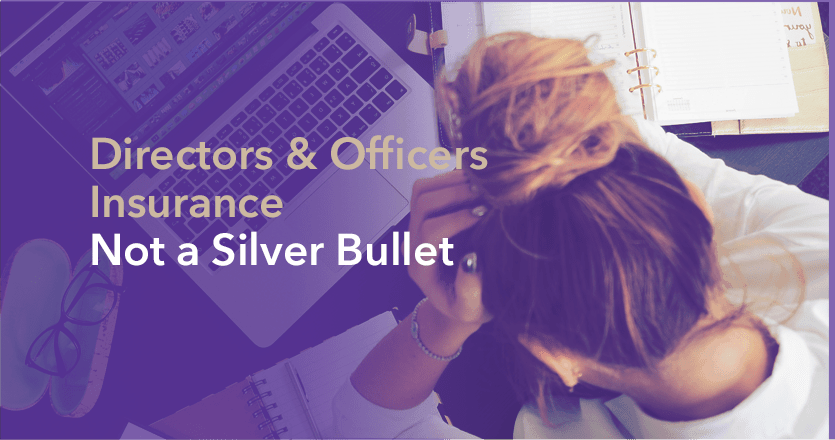Directors & Officers Insurance – Not a Silver Bullet

Many aspiring board directors that I meet with have a general misconception that they have no personal liability for corporate actions. Most companies are protected by Public Liability and other forms of business insurance. However, the officers within these organisations are not protected. Director & Officers insurance protects the directors and officers when they are sued by clients, employees, competitors and investors for alleged or actual wrongful deeds in a company. They can be sued for issues such as fraud, misrepresentation of the firm’s assets, lack of compliance with company laws and theft of intellectual property. If the company fails and goes into administration, they can face issues associated with insolvent trading and all business transactions in the lead up to a company being placed into administration can be carefully scrutinised.
Apart from protecting the individuals involved, D&O insurance protects the organisation, covers settlements, legal fees and miscellaneous. Globally, Director & Officers insurance makes up to $10.5 billion of premiums and the United States is responsible for 60% of this figure. Closely followed is Europe with 25% of total business while Australia, Asia, Canada and Latin America follow behind with single digit numbers.
The issue with Director & Officers insurance is that it sounds really good theoretically, but it is not blanket coverage and with the increasing cost of insurance, many companies opt for various exclusions and excess provisions to keep the costs of insurance down. If you were ever forced to make a claim, it means you allowed things to escalate too far. In the world of D&O insurance, there is no silver bullet when it comes to reducing and mitigating the risk involved with running a corporation. You should consider prevention by following the points listed below.
1. Ensure that technical action carried out by board members are documented
Important details, such as the number of meetings organised, attendance of members and contribution to meetings should be well documented. Try to ensure that the meeting content and the meeting length tally with the organisational agenda. Apart from avoiding costly errors during meetings, this will also help in saving everyone’s efforts and time. The company secretary should also be in attendance during these meetings to help ensure that the minutes are being documented. If possible, an external counsel can also be brought in to review these minutes to ensure that discussions are accurately being recorded and that the comments can be held up in court should the need arise.
2. Ensure that you avoid conflict of interest while managing organisational risks
Conflict of interest is not limited to its appearance; it can also be the potential for such to occur. This means that if one’s insight is wrong, it can go a long way in tarnishing the organisational reputation without any wrongdoing being carried out. Conflict of interest should be avoided by all means possible. And if this cannot be avoided, the conflicted person should be excluded from vital discussions and voting.
3. Ensure that the composition of the board is closely monitored
When the board members are composed of individuals from within the organisation, there might be danger looming ahead. This is because board members from outside the organisation tend to be more independent and bias-free in case an issue comes up. The size of the board should also be taken into consideration. In order to encourage professionalism and diversity, the board should be big enough. On the other hand, it shouldn’t be too big hindering the efficiency of existing board members. The board should be able to examine the performance of each director in order to address non-functional directors. It is imperative that each board member totally understands the company and its operational laws.
Final Word
In conclusion, the importance of Director & Officers insurance cannot be underestimated. It definitely protects affected individuals from some kinds of lawsuits but it doesn’t shield one from all types of lawsuits and personal liability. Adhering to internal measures and controls are more imperative than any insurance policy. If the risks are not properly analysed and control measures not taken to minimize occurrence, one stands a risk of claims at the hands of insurance companies, keeping in mind that the main aim of insurance firms is to increase income for their shareholders. Before joining the Board of Directors carefully review the companies D&O Insurance policy and in particular review the exclusions and excess provisions. It is advisable to carry your own personal D&O Insurance policy which augments the company policy in the case of legal action against the directors of the company.
Learn more about Director Institute Next Generation Directors.
